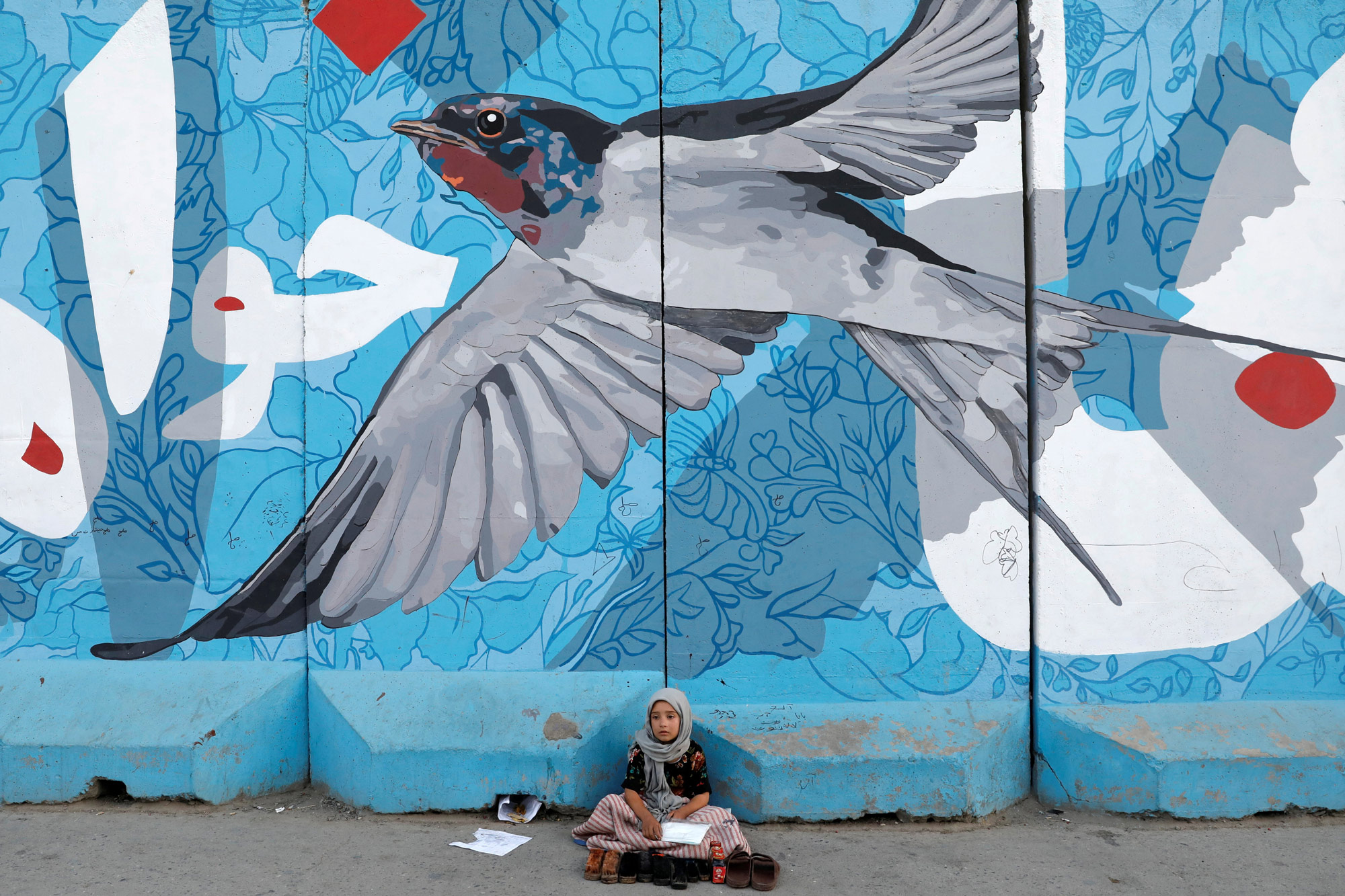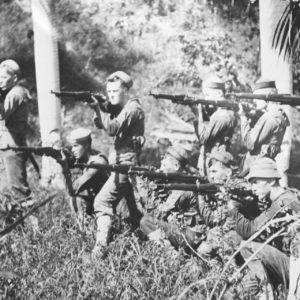The Afghan war and imperial delusions
The chaos in Afghanistan is the product of decades of intervention and failed counter-insurgency by politicians and military leaders falsely presenting themselves as benefactors.
Author:
1 September 2021

As the United States leaves Afghanistan after a violent and wasteful 20-year occupation, the Taliban has retaken the territory, which it controlled between 1996 and 2001. The US legitimated its invasion in 2001 as a police action to protect the Afghan people from a brutal, theocratic government that imposed an extreme interpretation of Islamic Sharia law.
The Taliban had given shelter to the Saudi-born Osama Bin Laden and his Al-Qaeda network in 2000. In the aftermath of the 9/11 attacks on civilian and military targets inside the US, the Taliban offered to negotiate a handover of the fugitive, but then-President George W Bush and his administration were determined to pursue military intervention.
This was presented as a case of good versus evil, with the American state saving both the people of Afghanistan and the world at large from barbaric political extremists. While avowed imperialists like Thomas Friedman gloated about “giving war a chance”, other commentators defended the military intervention as pro-feminist and for human rights.
Related article:
In reality neoconservatives including the vice-president and defense secretary then, respectively Dick Cheney and Donald Rumsfeld, the main ideological organisers of the post-9/11 “war on terror”, saw Bin Laden’s attacks as an opportunity to reorganise the Middle East and beyond under a new Pax Americana. This would provide lucrative new opportunities for the oil industry, arms manufacturers and private military contractors.
These wars were choices. In the wake of 9/11, US political leaders had a range of available diplomatic and financial methods that could have worked to apprehend Bin Laden and his network without the need for military deployment or invasion. The Bush administration ignored these in favour of a “forever war”, which has now lasted longer than World Wars I and II combined.
Military hubris
The bitter fruits of this war fever were already evident in 2001 with disastrous wars in Afghanistan, Iraq and Libya, the emergence of new terror groups such as the Islamic State, a loss of civil liberties in the the US in name of security and at least a million people killed, injured and displaced across the Middle East.
As with empires throughout history, the US frames itself as the vanguard of civilisation, saving the inhabitants of distant regions from misrule. But what was lost in the rush to war was the desires of the Afghan people. By 2001, the civilian population had already endured more than two decades of civil war and the chaos caused by their country becoming a proxy battleground for geopolitical conflicts.
Afghanistan did not become a safe haven for extremists like Bin Laden because of cultural “backwardness” but through covert and cynical foreign interventions. The Soviet aligned leftist Saur Revolution had taken power in the late 1970s, but the government alienated many Afghans with its brutal and excessive tactics. This gave rise to the Afghan mujahideen, Islamist fighters. Facing this revolt, the government pushed for an intervention, which even Soviet security agency the KGB felt was doomed. Despite having misgivings about the extreme reactionary politics of many of the mujahideen, including fears that they would one day turn on their backers, the US provided the Islamist fighters with aid and weapons as a way to weaken their Cold War rivals in the Soviet Union.
Related article:
After the Soviets withdrew from Afghanistan, mujahideen commanders became warlords who held the decimated country to ransom. In turn, Pakistan’s spy agency, the Inter-Services Intelligence, funded the Taliban, which began as a vigilante group in refugee camps in Afghanistan. They started out by sharing pamphlets funded by the US Central Intelligence Agency espousing a militaristic and puritanical Wahhabist interpretation of Islam.
The US, Pakistan and Saudi Arabia covertly supported radicalised fighters from Arab countries who used Afghanistan to gain battle experience throughout the 1980s and early 1990s. These included Abu Musab al-Zarqawi, the founder of Isis and pioneer of grotesque tactics such as online live screening of prisoner beheadings.
The US military temporarily pushed Taliban fighters out of the country, only for them to rebuild their forces in Pakistan. Rather than aiding the reconstruction of a broken country, the occupation cobbled together a new government of corrupt bureaucrats, warlords and drug traffickers who rebranded themselves as anti-Taliban “democrats”.
Instead of any kind of functional state, the Afghan people have experienced two decades of an occupation that rewarded the corrupt while compounding the misery of those already impoverished. Alongside these abuses from their own government and local class elites, the Afgan people experienced terror and torture from North Atlantic Treaty Organization forces, covert death squads and private miltary contracters.
Eternal counter-insurgency
Rather than offering a sober analysis of a war that should never have been fought, a range of security and counter-insurgency “experts” offered explanations for how the US could win the support of the civilian population.
Military intellectuals are now claiming, in high colonial fashion, that the failure of the regime-change project was not because of the imperial hubris of the US and its allies, but because the Afghan people are too unruly to govern themselves. In a recent article for the Daily Maverick, counter-insurgency expert David Kilcullen, alongside former Nigerian president Olusegun Obasanjo and security adviser Greg Mills, claim the lesson for the “West” is that “the rules for external actors and local recipients alike are: a small foreign footprint, delivery of enablers (including transport, logistics support), and let the locals do the fighting and lead”.
This treats the US and supporting powers as neutral actors legitimately concerned with spreading democracy and human rights. This rewrites history, omitting the imperial arrogance and corporate profiteering that has characterised the war on terror since its inception. It allows the politicians and military generals who orchestrated disastrous wars to present themselves as benefactors, rather than as brazen imperialists.
Related article:
Kilcullen is best known for his book Out of the Mountains: The Coming Age of Urban Guerrillas, which paints a dystopian picture of endless warfare in impoverished cities. According to Kilcullen, dangerous paramilitaries and armed groups, from Islamists in Afghanistan to narco-gangs in Latin America, surround the “civilised” West. But rather than addressing the obvious need for political and social solutions to problems, he uses a military gaze, calling for expanded security operations and proxy wars.
As historian Laleh Khalili argues, Kilcullen applies an “orientalist perspective” to the Global South, viewing the urban and rural impoverished as either voiceless victims or dangerous criminals. Counter-insurgency projects talk about winning hearts and minds but omit the actual voices of the people they claim to defend.
This has deep roots in the worldview of European imperialism, with its ideology of dark-skinned, atavistic enemies surrounding a “civilised” core. The military violence and structural injustices of colonialism and capitalism are white-washed as the defence of progress and order. When imperial forces are defeated, blame is ascribed to a lack of military support or the ingratitude of the locals.
In practice, however, counter-insurgency has always provided an ideological and technocratic gloss for expanded state violence. South Africa has an especially close link to this. In the aftermath of the British wars against the Zulu empire and Boer republics, military thinkers began to write manuals of how to win “small wars” against occupied populations.
Related article:
One of the earliest of these was The Defense of Duffer’s Drift by Ernest Dunlop Swinton. Based on his experience fighting the “wicked Boer” in South Africa, Swinton maintained that counter-insurgency requires conflict with the entire population. “Never trust the locals; detain them, burn their farms and starve them out, the women and children included,” Swinton concludes.
Later in the century, Afrikaner nationalists used counter-insurgency to try to crush mass resistance to the apartheid state. Military planners spoke of adopting sophisticated techniques from the French in Algeria and the Americans in Vietnam. In practice, however, they used the time-worn tactics of colonial oppressors, including as a mixture of torture, death squads and attempts to “win hearts and mind”, a phrase the notorious law and order minister Adriaan Vlok used frequently.
A counter-insurgency mindset continues to influence postapartheid policing. Communities expressing their constitutional right to protest are subjected to routine and not infrequently murderous police repression, which treats them as if they were insurgents trying to overthrow the state.
The stories we tell
The US punk band Priests released Good Time Charlie in 2019, a scathing song about Charlie Wilson, a US congressman closely involved in supplying the mujahideen. Its chorus identifies the moral self-righteousness and historical amnesia that continues to animate imperial adventurism to this day:
Good versus evil of stories we tell
We’re the only ones who never, ever go to hell
It’s not the kind of stock and trade we sell
Grandiose claims about “humanitarian intervention” have been used to justify a series of neo-imperial wars since 2001, which have disrupted, displaced and killed millions, wrecked a number of countries and made the world even more unstable and dangerous. Rather than allowing the architects and benefactors of these disasters to rewrite history, it is important we question the imperial arrogance and militaristic belligerence sustaining these “forever wars”.




